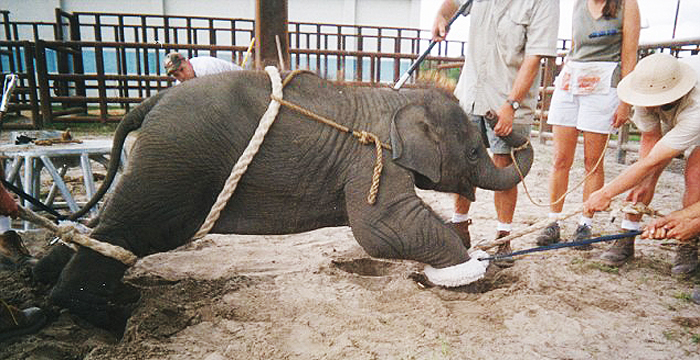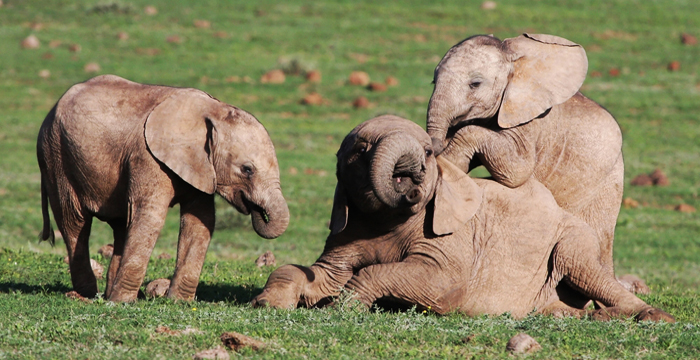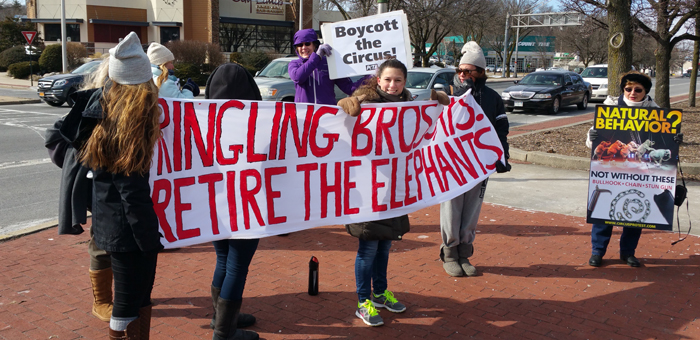For more than a century, elephants were ubiquitous in the circus world. Their historical and cultural presence is evidenced in elephant marches through New York City, rides and photo opportunities for children, even the cartoon character Dumbo.
But tamed elephants are tortured elephants. The time has come to ban their use in circuses and all forms of entertainment.

Elephant training at the circus. Via PETA
The sheer beauty, size, and presence of these magnificent animals have inspired childhood imaginations for generations, but belie an ugly secret side that lurks behind the scenes. Imagine this: a baby elephant stolen from its mother, subjected to systematic beatings and piercings with a bull hook, an instrument that looks like a sharpened fire poker. It spends its young life being coerced into performing in physiologically stressful contortions, otherwise known as entertainment tricks.

Elephants playing in the wild. Via Shutterstock
To ensure its full submission and its owner’s total domination the elephant is then shackled and placed in a concrete cell, with only enough space to turn around, where it must stand for up to 20 hours a day. Its screams and cries are ignored. When outside alone its ankles are chained to assure the safety of the public. All of this is designed to break the animal physically and psychologically.
Biologically, elephants are designed to roam up to 30 miles a day but because they are forced to stand in a concrete cell, they develop myriad health conditions such as diabetes, obesity, and fatal foot disease, in addition to many other physical and psychological maladies. Elephants, like humans, need interaction with their own species. The confined cells, restricted mobility and lack of social contact lead to severe depression and anxiety. It is no surprise elephants live half as long in captivity as in the wild.
As these stark realities have become known, public perception and opinion about elephants in entertainment have shifted. In fact, Ringling Brothers & Barnum and Bailey Circus is removing their elephants from circus performing to a sanctuary this spring. The announcement came after decades of protest, and after cities across the United States implemented bans, making it difficult for Ringling Brothers to travel, perform, and house their elephants.
In a telling statement to The New York Times, Stephen Payne, a spokesman for Feld Entertainment, parent company of Ringling, said, “Rather than fight city hall, we decided to take those resources and use them for conservation of the species.” National Geographic Magazine quoted a rare moment of candor from a member of the Feld family:
In an interview with the Associated Press, a Feld Entertainment executive vice president acknowledged a “mood shift” among the circus’s consumers.
“A lot of people aren’t comfortable with us touring with our elephants,” said the executive, Alana Feld.

Pace Environmental Policy Clinic students demonstrate against use of entertainment elephants outside the Royal Hanneford Circus, which has been cited nine times in the past 15 years for the mistreatment and abuse of elephants in violation of the Federal Animal Welfare Act.
Economic benefits from the use of elephants in entertainment accrue solely to the owners of the elephants, and the circuses and fairs that use them. The local cultural, economic, and social boosts in are temporary at best. Jennifer Fearing, chief economist of the Humane Society of the United States, reported that traveling entertainment acts that come to Massachusetts do not produce new economic benefits, but instead redistribute discretionary spending which would otherwise be spent locally. She concluded that new economic activity must be spent by new visitors from outside the local region. Economists also conclude that entertainment acts without elephants have better economic outcomes.
It is morally unjust to use elephants in entertainment and conveys the wrong message to both child and adult. The Environmental Policy Clinic at Pace University in Pleasantville has drafted an Elephant Protection Act, which aims to prohibit elephants from entertainment acts in New York State by 2018. We are working with members of the both houses of the state legislature to have the bill introduced this session. If enacted, the bill will hopefully set a precedent for other states and perhaps even Congress.
«« »»
 Pavan Naidu is a Pace University political science major and a member of the Circus Team of the Pace Environmental Policy Clinic. His interests include global policy and international relations. He will graduate in May. At left, NEWS 12 interviews Pavan Naidu about mistreatment of elephants in circuses.
Pavan Naidu is a Pace University political science major and a member of the Circus Team of the Pace Environmental Policy Clinic. His interests include global policy and international relations. He will graduate in May. At left, NEWS 12 interviews Pavan Naidu about mistreatment of elephants in circuses.











Throughout the semester, we learned about the cruelty done to elephants in the circus business. We fought hard as a class to piece together a bill to bring an end to the elephant abuse. This article is really the turning point for the class in the semester. Starting with an idea at the start of the semester and possibly ending with a bill being passed in legislation is a huge deal! Now all that is left to be done is raise public awareness and interest in our bill. Great work on the article!
#RetireTheElephants
Pavan,
Great article! This semester we really learned the importance of education. Writing this blog post brought out the highlights and lessons we learned throughout the semester. It is time to take the elephants out of entertainment acts.
Great information on the story of elephants within circuses Pavan! Hopefully the bill that the Pleasantville Policy Team is writing will set the precedent for many other states to follow, and hopefully, will also set the precedent for many other animal rights bills to be passed on behalf of the many other animals being held in captivity by circuses.
Great Article on the abuse of these majestic creatures. I am encouraged by these developments as it reflects a shift in our anthropocentric culture towards a more biocentric attitude. Specifically this brings to mind the captivity of whales at Sea World for our pure entertainment. Just as with the Elephants these whales deserve to be free. Ultimately It is my hope that that we will evolve to value animals enough no longer have zoos. These wild Animals should not be domesticated but should roam wild and free.
Well said Pavan. The best part about this whole experience was getting the chance to spread the word an enlighten many people to the abuse these elephants suffer through. A lot of people honestly don’t realize the harm that entertainment acts do to such a large and complex animal. Seeing the shift in perspective throughout the public is great to watch. Being apart of the change has been pretty inspiring and I’m excited to see where this legislation will lead. I’m defiantly hoping to see other states follow NY’s lead if the legislation does in fact become law. After that who knows, the protection of these animals defiantly shouldn’t stop at circuses.
This is great background information on the issue Pavan. It’s bizarre what they put the elephant through in order to make it perform. I think the fact the Ringling Circus has realized that continuing the use of elephants in their acts is a poor decision will really fuel support for legislation in New York. Besides the fact that the use of elephants in circuses really only economically benefits the circus owners, is there any indication that people would stop going to the circus because there were no elephants? I would imagine with the bad publicity surrounding the issue that publicly declaring that a circus is ceasing the use of elephants would be a boon to business.
Thank you for the comment Carl! Yes, it is imperative that the public is educated on the issue. As an individual our voice truly does have power to make a difference. Keep spreading the word and hopefully can get this bill passed!
This is a really great summary of the issue of circus elephants and what we as clinicians have done this semester about their treatment. It’s great how you hit on all the important areas of concern that people might have with removing the elephants. It’s important that the general public understands that there no economic or educational gain to their use. Coupling that with how awful it is for elephants to live in conditions so far removed from their natural ones, in my opinion, creates a really solid argument for them to be discontinued as entertainers. It seems that now the biggest problems we face with circuses are where to put the retired performers and how to get all wild animals removed from their acts.
OK, hold on there. I would not be handing out too much credit to Ringling Brothers & Barnum and Bailey Circus. What the article neglects to say is that RB&BB are retiring their elephants to a breeding facility where they will be bred so that the babies can be sold off to zoos. Keeping in mind that zoos are part of the entertainment industry as well.
Not to mention that this same facility has agreed to use these elephants in experiments for cancer research. These experiments have already begun on elephants already housed at this facility. What harm these elephants will be subjected to from these experiments has not been fully disclosed.
Make no mistake about it, none of these actions have been exclusively done for the welfare of these elephants. These (business) people have just found a more profitable way to exploit them.
Getting elephants out of entertainment arenas like circuses is a very good start. But like the article mentioned, elephants need large areas of land to physical thrive and they need their matriarchal herds for psychological and emotional health. These are complex, intelligent creatures and the only true way to show compassion for their needs is to leave them in the wild.
Man’s sole mission for the elephant should be in protecting their natural habitat. Land encroachment, poaching, climate change are all issues that need to be addressed if we are ever to expect see these most magnificent animals roam free without the fear of harm from humans.
Hi Sherry, thank you for the comment. The part in which you highlight the concerns about Ringling Brothers & Barnum and Bailey Circus, was written to develop on the fact that there is a fundamental societal shift away from elephants.
I agree that all inhumane practice regarding elephants should be stopped. They are highly complex, intelligent, and beautiful mammals that deserve to live untouched in their natural habitats. Unfortunately they’ve been kidnapped and are in entertainment acts, subjected to abuse.
Speaking for myself, I believe we must take steps in order to ensure the welfare of these creatures through pragmatic means. The Elephant Protection Act is designed to prohibit elephant cruelty by banning them entertainment acts in NY. The hope is that this sets a precedent for other states to follow suit. Sanctuary regulation has a mutually exclusive relationship. It is needed but would require separate legislation.
Regards,
Pavan
Very nicely said! I’m extremely happy Pace’s Pleasantville campus is having so much success with their policy making. New York City’s clinic is rooting for you guys!
Well done Pavan. Along with the work we have done in Albany and up to this point to get the legislature on board, we must continue to get this information out there so we can further educate the public. Our petition which received over 1100 signatures from Pace students, faculty, and staff alone was a huge accomplishment in regards to our awareness efforts but it mustn’t stop there. After explaining the petition and its purpose it was surprising to hear many people say, “I had no idea.” So we must continue to give people knowledge in order to put more pressure on the legislature and circuses themselves. Maybe if the people, especially the children, knew what these beautiful creatures endure solely for our entertainment we could save lives.
Nicely said Pavan. I really hope the “Elephant Protection Act”gets passed into legislation. Words can not decribe the emotional and physical toll the circus environment forces apon these gental giants. If the bill gets passed the State of New York will be in the position to be the leader in rectifying the cruelty placed on elephants for over a century.